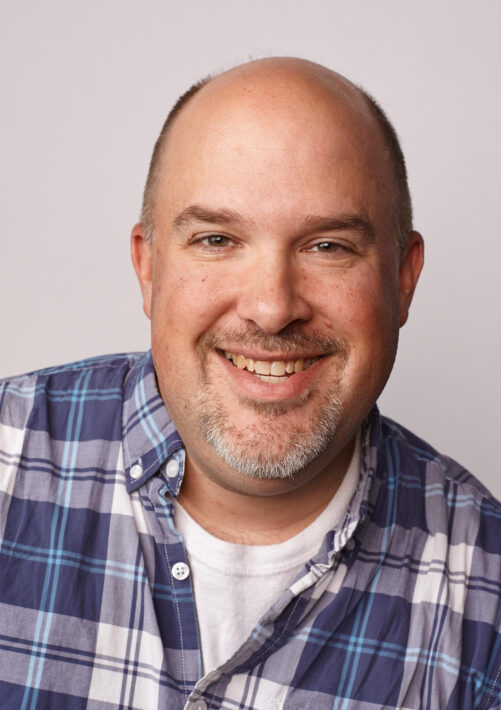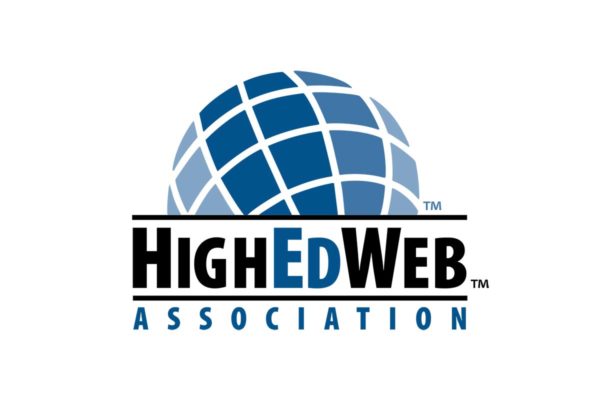New Board Member Chris D’Orso talks about his ambitions for HighEdWeb and his favorite conference memories
Earlier this fall, HighEdWeb elected Chris D’Orso, Associate Director of Undergraduate Admissions at SUNY Brockport, to a three-year term as a member of the Board of Directors, replacing outgoing member Jeff Stevens. In addition to his role on the board, D’Orso will serve as a liaison to the annual Accessibility Summit, as well as to the volunteer committee.
Like many HighEdWeb members, D’Orso first found this community not in person, but on Twitter. He was leading social media efforts for New York’s Stony Brook University at the time higher education social media was moving from “something the students do” to an essential aspect of enrollment marketing and constituent engagement efforts.

“For me, HighEdWeb was a godsend, because there were other people doing what I was doing,” says D’Orso, recalling his first HighEdWeb Annual Conference in Buffalo in 2013. “I was the only one on my campus doing social media at the time and it was so misunderstood. To be able to put some knowledge and some logic and substance behind (social media) really made quite a difference for me on every level.”
As the higher education social media landscape has evolved dramatically since 2013, HighEdWeb’s relevance and value to D’Orso’s work has only strengthened – and he wants to give back. After nearly a decade as a member, conference presenter, and volunteer, D’Orso is joining the HighEdWeb board this fall. In this conversation with Link, he shares his favorite HighEdWeb memories and what he hopes to achieve in his role as a board member.
Link: Tell me what you remember most about that first HighEdWeb conference you attended in Buffalo.
Chris: I was following folks who were HighEdWeb folks on Twitter – it was this whole online community of people who I knew, but obviously hadn’t met in person. My favorite Buffalo moment of the conference was one of the welcome events, when I saw Robin Smail from Penn State. I was like, “It’s Robin, I know her from the internet!” She turned as I approached and said “Chris!” before I even had a chance to introduce myself. It was a realization that all these people I was communicating with, they were real people. That was a really cool thing.
Link: Is there a HighEdWeb conference presentation – yours or someone else’s – that you always go back to?
Chris: Is it hokey to say it’s your own presentation? I feel like the session that we won the Red Stapler for in Sacramento in 2018 (“Can You Do It In The Dark? Making Your Social Media Accessible,” with Justin Romack, assistive technology coordinator at Texas A&M) was lifechanging for me on so many levels. The topic – accessibility and social media – hadn’t been covered in as plain-language a way as we wanted to cover it. It opened so many people’s eyes, including mine, to the fact that the way that you – the general you, the specific you – use social media is not the way everybody does. It’s really easy to be caught up only in what you know.
At 45, I use Twitter and Facebook in a certain way, but I’m much more conscious now of how I do. I think about the color contrast of images and alt tagging. These were things that were always available but because I’m not blind, they didn’t affect me directly, so I didn’t know they existed. I never thought about captioning before, then I went in and dug around and realized that accessibility isn’t just important for those who need it, but for everyone. That was important for me, as a professional and just as a human being, to get ripped out of my comfort zone for a bit.
Link: What is the most valuable thing about HighEdWeb membership for you?
Chris: The connection. There are a lot of times when you’re working on the web and it’s really easy to feel isolated in that. I suppose every department on a campus has some degree of this, where you feel, “no one understands what I do.” But HighEdWeb shows that there are other folks facing the same challenges and issues that you are in parallel universes of other campuses. And that’s more helpful than I ever would have realized.
Social media has changed – it went from “It’s free, so let’s do it” to “There’s actual value here,” and we’re putting money into it in concrete ways. HighEdWeb helps us, as individual managers, find the best ways to do that. To look beyond what just our competitors are doing to what is possible in the spectrum of what’s out there, in terms of new platforms and changes to current platforms. There’s an enormous amount of knowledge in practice across the organization, and there are folks who are overwhelmingly eager to share that knowledge, which is really wonderful.
Link: What inspired you to join the HighEdWeb board?
Chris: For me, joining the board is an opportunity to help. I think we know [HighEdWeb] needs to be more diverse and inclusive than what we are. The web tends to be overly male and overly white. I know it’s weird saying “I’m a white guy and I’m joining the board” while saying that, but I want to help expand the organization; to get voices in here that aren’t necessarily being heard or people who aren’t necessarily being seen. My hope as a board member is to help proselytize and spread the word of the HighEdWeb brand in places we haven’t been, so we are thinking of folks who aren’t at the table.
Link: What’s one thing you want people to know about you as an incoming HighEdWeb board member?
Chris: For me, professionally, I understand it’s not about me. I love being able to see folks have successes based on what they’re doing as part of the organization. I think I would want folks to know that I’m an advocate. If there’s something that you think is important, something you need, something you want to see, something that could bring value to you as a professional and a human being – I want to be able to fight for and advocate for that.
In addition to his roles at SUNY Brockport and on the HighEdWeb board, D’Orso currently serves as the president of the SUNY College Admissions Professionals (SUNYCAP) program. A lifelong New Yorker, he has previously worked at Stony Brook University, Finger Lakes Community College, and SUNY Old Westbury, and holds a BA from SUNY Geneseo and an MS from Long Island University. D’Orso is proudly genderfluid, a Mets fan, a baseball card collector, and a pub quizmaster – and he also got his butt kicked on “Jeopardy!,” a defeat he rues to this day.

